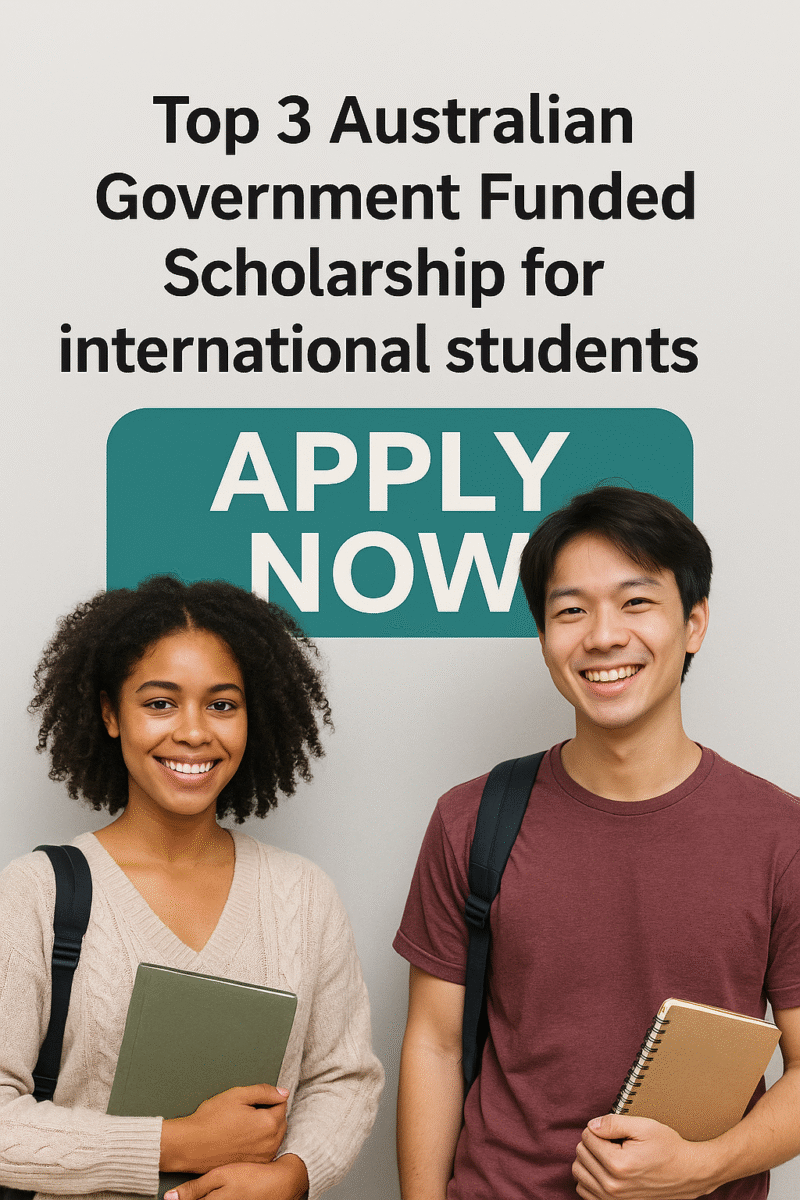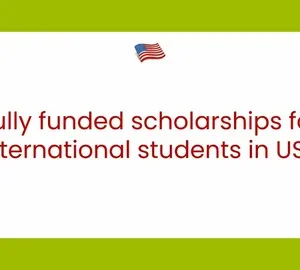Discover the top 3 Australian Government funded scholarships for international students in 2025—fully funded options with tuition, living costs, and research support.
Studying abroad is a dream for millions of students around the world. Among the most popular destinations for international education, Australia stands out — not only for its world-class universities but also for the government-funded scholarships that make education more accessible. These scholarships remove the heavy burden of tuition fees, living costs, and health insurance, enabling students to focus on academic excellence and personal growth.
If you’ve ever wondered “Can I study in Australia without paying high tuition fees?”, the answer is a big yes — thanks to Australian Government funded scholarships. In this detailed guide, we will cover the Top 3 Australian Government scholarships for international students:
-
Australia Awards Scholarships (AAS)
-
Destination Australia Scholarship
-
Research Training Program (RTP) Scholarships
We’ll explore eligibility, benefits, fields of study, application tips, and real student experiences. By the end of this article, you’ll have all the knowledge and tools you need to apply confidently.
1. Australia Awards Scholarships (AAS)
The Australia Awards Scholarships (AAS) are Australia’s flagship development scholarships, funded by the Department of Foreign Affairs and Trade (DFAT). They are designed to promote knowledge, education links, and enduring ties between Australia and its partner countries, particularly in Asia, Africa, and the Pacific.
1.1 Benefits of Australia Awards Scholarships
The AAS is one of the most generous international scholarships available. Here’s what it covers:
-
Full Tuition Fees: The scholarship pays your entire university tuition.
-
Airfare: Return economy air travel to and from Australia.
-
Establishment Allowance: To help cover costs of books, accommodation, and study materials.
-
Contribution to Living Expenses (CLE): A fortnightly stipend for everyday living costs.
-
Overseas Student Health Cover (OSHC): Ensures medical coverage during your stay.
-
Supplementary Academic Support: Includes tutoring and preparatory programs.
-
Fieldwork Allowance: For students undertaking fieldwork (mainly research students).
With all these benefits, you can focus on excelling in your academic journey without financial worries.
1.2 Eligibility Criteria
To be considered for AAS, you must:
-
Be a citizen of an eligible developing country listed in the AAS official country list.
-
Meet the academic requirements of your chosen Australian institution.
-
Demonstrate proficiency in English (IELTS, TOEFL, or PTE).
-
Show commitment to return to your home country for at least two years after completing studies.
-
Not hold Australian or New Zealand citizenship.
1.3 Fields of Study
Australia Awards prioritize courses that support the development needs of partner countries. Popular fields include:
-
Public Policy and Governance
-
Agriculture and Food Security
-
Health and Medicine
-
Engineering and Technology
-
Climate Change and Environment
This ensures that when scholars return home, they bring skills that directly contribute to national development.
1.4 Student Experience Example
Take the story of Maryam from Nigeria, who pursued a Master’s in Public Health through AAS. Upon graduation, she returned home and now works with her country’s Ministry of Health, influencing policies on maternal and child care. Her story reflects how the AAS is more than just a scholarship — it’s a life-changing opportunity.
2. Destination Australia Scholarship
The Destination Australia Scholarship is a unique program that encourages international students to study in regional Australia rather than the big cities. Funded by the Australian Government, it aims to support both education and regional communities.
2.1 Benefits of Destination Australia
-
Up to AUD $15,000 per year per student.
-
Renewable for the duration of your program.
-
Opportunity to study in beautiful regional towns, where living costs are lower.
-
A chance to experience authentic Australian culture outside metropolitan hubs.
2.2 Eligibility Criteria
To apply, you must:
-
Be enrolled as a full-time student in a regional Australian institution.
-
Meet the admission and English requirements of the host university.
-
Maintain satisfactory academic progress throughout your studies.
2.3 Why Regional Australia?
Regional Australia offers benefits beyond cost savings:
-
Closer-knit communities where students receive more personal support.
-
Access to industries like agriculture, mining, healthcare, and tourism.
-
Post-study work visa benefits — students who study in regional Australia often get longer post-study work rights compared to those in cities like Sydney or Melbourne.
👉 Official info: Destination Australia.
2.4 Student Experience Example
For instance, Ravi from India won a Destination Australia scholarship to study nursing in Tasmania. Beyond academics, he enjoyed the serene environment, affordable living, and eventually secured a job in a regional hospital, making him eligible for permanent residency pathways.
3. Research Training Program (RTP) Scholarships
The Research Training Program (RTP) is designed for students who want to pursue Masters by Research or PhD programs. Funded by the Department of Education, RTP focuses on building Australia’s research capacity while welcoming top international talent.
3.1 Benefits of RTP
-
Tuition Offset: Covers tuition fees for up to 4 years for doctoral students.
-
Stipend: Around AUD $32,000 per year (varies by institution).
-
OSHC: Comprehensive health coverage.
-
Allowances: For relocation and research costs.
This ensures that students can conduct research without financial distractions.
3.2 Eligibility Criteria
-
Must be enrolled in an eligible research degree at an Australian university.
-
Academic excellence and research potential are key.
-
Institutions select candidates competitively — so a strong research proposal is critical.
3.3 Fields of Study
RTP supports research across diverse fields, including:
-
Science and Engineering
-
Health and Medical Research
-
Social Sciences and Humanities
-
Climate and Environmental Studies
3.4 Student Experience Example
Li Wei from China received an RTP scholarship for her PhD in Renewable Energy at the University of Queensland. Her research on solar energy efficiency is now cited globally, showing how RTP alumni contribute to international innovation.
👉 More details: Research Training Program.
Comparison Table of Top 3 Scholarships
| Scholarship Name | Study Level | Benefits | Duration | Focus |
|---|---|---|---|---|
| Australia Awards (AAS) | Undergrad & Postgrad | Full tuition, airfare, living stipend, OSHC | Program length | Development-focused |
| Destination Australia | Undergrad & Postgrad | AUD $15,000/year | Course duration | Regional universities |
| Research Training Program (RTP) | Masters/PhD | Tuition, stipend, OSHC, research support | 2–4 years | Research & innovation |
How to Apply for Australian Scholarships
-
Research Programs Early: Applications can open up to a year in advance.
-
Prepare Documents: Academic transcripts, English test scores, CV, references.
-
Write a Strong SOP: Explain why you chose the course, your career goals, and how it benefits your country.
-
Apply via Universities or Official Portals: Some scholarships require direct application to institutions, others through government portals.
-
Prepare for Interviews: Especially for AAS, where leadership and community contribution matter.
Common Mistakes Applicants Make
-
Submitting incomplete documents.
-
Missing deadlines.
-
Failing to tailor applications to scholarship goals.
-
Overlooking the requirement to return home (AAS specific).
-
Weak research proposals (RTP specific).
Conclusion
The journey to studying in Australia doesn’t have to be blocked by financial limitations. With scholarships like the Australia Awards, Destination Australia, and the Research Training Program, you can achieve your academic dreams while experiencing life in one of the most dynamic countries in the world.
These scholarships are more than financial aid — they are investments in your future. They open doors to top universities, research opportunities, and even pathways to permanent residency. If you’re serious about your future, take the first step today and start your application journey.
FAQs
1. Which is the most competitive scholarship in Australia?
The Australia Awards Scholarships are highly competitive due to their full funding and global prestige.
2. Can undergraduate students apply?
Yes, both AAS and Destination Australia support undergraduate programs. RTP is mainly for postgraduate research.
3. What English scores are accepted?
Most scholarships accept IELTS, TOEFL, or PTE scores. Minimum scores vary by university.
4. Do scholarships cover family expenses?
Generally, these scholarships do not cover dependents, though OSHC sometimes extends to family at extra cost.
5. When is the best time to apply?
Applications usually open in February–May for the following academic year. Always check official portals.





